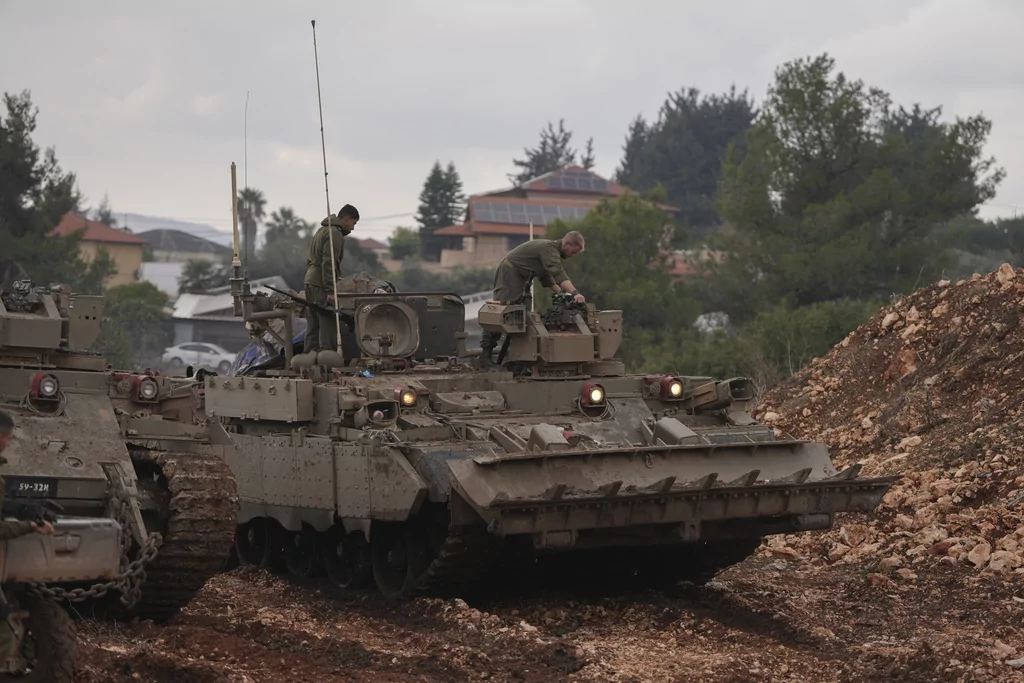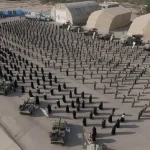
Israel and Hezbollah accused each other of breaking the ceasefire that took effect only a day prior.
The Israel Defense Forces announced on Thursday that several “suspicious incidents” had been identified in southern Lebanon in violation of the ceasefire. The IDF and Israeli Air Force had responded with strikes.

“Earlier today, IDF soldiers identified two terrorists arriving at a known terrorist infrastructure site, that had been used to fire dozens of projectiles into Israel over the past month. The IAF struck the terrorists,” a statement from the IDF read.
“Additionally, over the past hours, IDF soldiers operated to prevent the advancing of additional terrorists in southern Lebanon,” it added.
According to Lebanon’s state-run National News Agency, two Lebanese were wounded in an alluded-to artillery strike near the border.
Meanwhile, Hezbollah accused Israel of violating it.
Hezbollah lawmaker Hassan Fadlallah in turn accused Israel of violating the deal.
“The Israeli enemy is attacking those returning to the border villages,” Hezbollah lawmaker Hassan Fadlallah told reporters. “There are violations today by Israel, even in this form.”
The Lebanese military, tasked with enforcing the ceasefire, also accused Israel of violating the ceasefire.
“On 27 and 28 [November] 2024, after the announcement of the ceasefire agreement, the Israeli enemy violated the agreement several times, through air violations, and targeting Lebanese territory with various weapons,” a statement from the Lebanese Army read. “The Army Command is following up on these violations in coordination with the relevant authorities.”
According to Axios, Lebanese Prime Minister Najib Mikati and the Speaker of Parliament Nabih Berri spoke with French President Emmanuel Macron, one of the ceasefire enforcers, after the attacks on Thursday. They urged him to take more action to pressure Israel not to attack further.
As part of the ceasefire, Israel is allowed to hit targets deemed imminent threats.
The IDF Chief of the General Staff, LTG Herzi Halevi, pledged to continue strikes whenever Israel sees fit.
“Any violation will be enforced with fire. This is our duty to the residents of the north,” he said.
“Any deviation from this agreement will be enforced with fire. The Northern Command knows this,” Halevi added. “I’ll also speak shortly about the role of the Israeli Air Force. We will enforce this strongly and decisively. This is important because of the tremendous effort we made to reach this point. But more than that—the residents of the north are watching now, and they want to see us resolutely enforce this so they can return to their homes. This is our duty to them, and our duty to ourselves. But first and foremost, it is our duty to the residents of the north. Therefore, we will proceed with unwavering determination in enforcement.”
The developments don’t bode well for the ceasefire, which took effect on Wednesday.
President Joe Biden announced Tuesday that Israel and Hezbollah had agreed to a 60-day ceasefire, including the withdrawal of Israeli ground forces from Lebanon and the withdrawal of heavy Hezbollah weapons north of the Litani River. It reflected the same deal that ended the 2006 Israel-Hezbollah War, though Hezbollah quickly broke the terms that time around. This deal allows for better enforcement by the Lebanese military and a panel of five countries, led by the United States.
While both sides welcomed the ceasefire, experts and analysts are split on its viability. Both sides are eager to cease hostilities and regroup but have incentives to break the ceasefire.
Foreign Policy noted that the two sides have near-zero trust that the other will keep their part of the bargain, and Israel is emboldened by its success over the past three months in its ability to degrade Hezbollah through direct strikes. Hezbollah, meanwhile, faces drastic damage to its prestige by failing to assist its ally in the Gaza Strip, Hamas.
CLICK HERE TO READ MORE FROM THE WASHINGTON EXAMINER
While Netanyahu hinted in his address announcing the ceasefire that the Israeli military was stretched to its limit and needed a break from fighting, Hezbollah emerged as the clear loser of the war. Aside from the destruction of the majority of its weapons arsenal and the death of its senior leadership, it must also grapple with the complete loss of the prestige it gained by dealing Israel one of its first major defeats in 2006.
According to the Lebanese Health Ministry, 3,768 people have been killed in Lebanon and 15,699 wounded since October 2023. Israel suffered 45 civilian deaths and at least 73 military deaths, Reuters reported.





